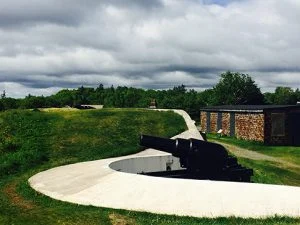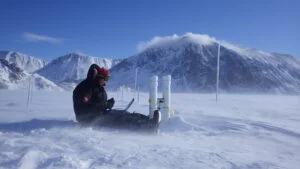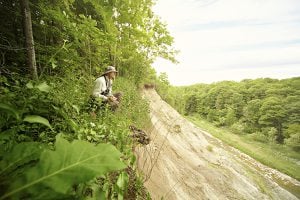
History
Parks Canada places commemorating the First World War
Sites across Canada honouring the war
- 1412 words
- 6 minutes
People & Culture
On July 27, 1953, an armistice was signed ending the bloodshed of the Korean War — if not the war itself — but questions have since been raised surrounding the conflict’s remembrance in Canada and beyond

This feature forms part of Commemorate Canada, a Canadian Heritage program to highlight significant Canadian anniversaries. It gives Canadian Geographic a chance to look at these points of history with a sometimes celebratory, sometimes critical, eye.
“He was a fine, good kid,” remarks Alma MacLean, 88, of Antigonish, N.S., glancing at a picture of her late, forever youthful brother. “But he was reckless.”
That much about Private Bernard “Tunny” MacDonald is abundantly clear. Together with Alma’s son Paul, 65, who sits across a table adorned with commemorative mementos, the family recount many a tale.
A boy, one of 10 siblings, ever keen to tease his sister.
A young Canadian grocer’s assistant who, out on deliveries, drives his horse and wagon down Hillcrest Street just a little too fast.


“But he never got into any trouble,” Alma explains. “He was always a good kid that way, and he served mass at the cathedral … When he went to Korea, Momma had a letter after he passed away [aged 20] from the padre there, saying that Tunny sang mass for them every time they were able to have mass.”
Following North Korea’s invasion of South Korea on June 25, 1950, Tunny, like many Canadians — ultimately numbering over 26,000 — had answered the call.
Over the next three years, the United Nations’ multinational force would endure a bitter struggle against Kim Il Sung’s troops and later those of the People’s Republic of China. At first defined by rapid gains and losses, the conflict would subsequently descend into a stalemate reminiscent of the First World War.
By Jan. 8, 1953, amid continuing peace talks, few in The Royal Canadian Regiment — stationed on the long-stagnant Jamestown Line — had any desire to be reckless, aware of the ever-increasing potential for a ceasefire.
Yet it would be kindness, not recklessness, that defined Tunny’s final hours.

“He wasn’t supposed to be on patrol that night,” says Alma. “But there was another young fellow going home the next day, and he didn’t want to go out. And so they asked for volunteers, and Tunny volunteered.”
Commanded by Lieutenant Dan Loomis, No. 7 Platoon was to reconnoitre a former Chinese outpost near a terrain feature dubbed “The Hook”. Joining the patrol — alongside others — was Tunny’s friend Private Bill Allan.
Initially, everything appeared to go according to plan.
Then came the explosion — a mortar round, perhaps, or an artillery shell burst.
The Canadian patrol did not stay long enough to determine its origins, instead withdrawing to relative safety and taking a roll call.
“They called the names to see if everybody was back,” says Alma. “But the Padre said he didn’t know if they didn’t call Tunny’s name or they just didn’t hear it when it was called. Anyway, he didn’t get back with the other boys, and the next morning they [including Pte. Bill Allan] went out looking for him and they found him … He had died instantly, so that was a comfort in a way.”
At 10 a.m. on July 27, 1953 — a mere six months after Tunny’s death — an armistice between the two sides was signed in Panmunjom. A ceasefire came into effect 12 hours later, although as of the 70th anniversary of the armistice’s signing in 2023, the Korean War has not technically ended.
Meanwhile, there would be little fanfare for those service personnel returning to Canada and indeed beyond. Their sacrifices on a distant peninsula had not galvanised a nation — or nations — in the same way as the Second World War. Thus, in the minds of innumerable Korea veterans, their contributions were met with widespread indifference in the months and years that followed.
“There’s a lot happening in Canada [at the time of the armistice],” notes Dr. Tim Cook, chief historian at the Canadian War Museum and author of numerous Canadian military history books. “The economy is growing and there is an election in 1953 … Canadians are getting on with their lives.”

Such realities could not bring back the 516 Canadians killed during the 1950-53 conflict. For families of the fallen, including the MacDonalds, the absence of a National Korean War Memorial made closure all the harder.
Dr. Cook continued: “The two world wars still dominate the commemorative landscape in Canada … They were massive, total wars involving almost two million Canadians in uniform … You can’t say the same about the Korean War, and you shouldn’t say the same, and we shouldn’t try to elevate it into something that it is not … That doesn’t mean it should be forgotten.”
The MacDonalds had no intention of letting that happen.
In the 1990s, one of Alma’s sisters, Mary Robertson, requested photographs of Tunny’s faraway grave, soliciting the support of her local Korea Veterans Association (KVA) branch. These the family would receive, but the appeal would likewise mark the beginning of an important collaboration.
Ultimately, Mary started working with the branch’s president in the hope of establishing a Korean War commemorative site in Canada. That president: Tunny’s comrade in arms and fellow patroller, Bill Allan.
Now the last of the MacDonald siblings, Alma remembers what happened: “[Mary and Bill] went to the Department of Veteran Affairs. They didn’t have any money to do anything. So, [Mary and Bill] put out a fundraising campaign to the Legions [across the country] … and they raised the money themselves.”
Denied government funds, donations poured into the newly-created KVA committee from military organisations, trusts, corporations, small businesses, clubs, communities, Korean-Canadian groups, individual politicians, and, above all else, the veterans themselves. In time, a total of $300,000 was raised.
On July 27, 1997, on what was then the 44th anniversary of the armistice, the National Korean War Memorial was finally unveiled in Brampton, Ont. Situated in Meadowvale Cemetery, the grey granite Wall of Remembrance bears the names of the fallen on a curved plane approximately 60 metres long and just under a metre high.
For Mary, who attended the ceremony with her sister Helen Arndt and almost 1,600 other guests, the wall afforded her the closure she had long sought. “It brought me close to [Tunny] again,” she once remarked. “ … touching the wall, I felt he wasn’t in Korea anymore. We have brought their spirits home.”
Back in Antigonish in 2023, Tunny’s spirit is as alive here as it was when Alma’s two now-late sisters felt it at the memorial some 26 years ago. Snow is falling outside the house, but there is nothing but warmth as Alma recounts Private Bernard MacDonald’s legacy, and the legacy of the family overall.
Daughter Kim, 66, has arrived. Together with Alma and Paul, the three pose for a photograph beside Tunny’s portrait standing proudly in the living room.
“He was very handsome,” Alma notes with a softened smile. “He was a good person — even if he did pull my hair.”
Are you passionate about Canadian geography?
You can support Canadian Geographic in 3 ways:

History
Sites across Canada honouring the war

Science & Tech
Celebrating Canadian Innovation Week 2023 by spotlighting the people and organizations designing a better future

Places
In Banff National Park, Alberta, as in protected areas across the country, managers find it difficult to balance the desire of people to experience wilderness with an imperative to conserve it

Places
It’s an ambitious plan: take the traditional Parks Canada wilderness concept and plunk it in the country’s largest city. But can Toronto’s Rouge National Urban Park help balance city life with wildlife?